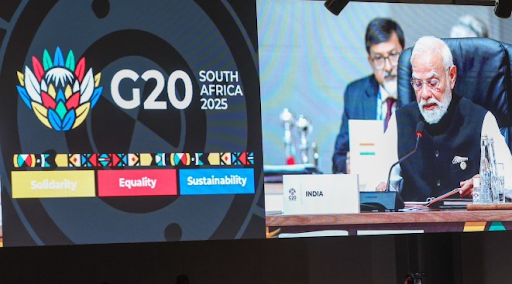



At the Johannesburg G20 Summit, India proposed six initiatives: a Traditional Knowledge Repository, Africa Skills Multiplier Program, Global Healthcare Response Team, drug-terror nexus framework, Critical Minerals Circularity plan and Open Satellite Data Partnership. These aim to boost health, security, technology and reinforce India’s role as the Global South’s voice.

Copyright infringement not intended
Picture Courtesy: NEWSONAIR
Prime Minister Narendra Modi proposed six new initiatives aimed at global development at the G20 Leaders’ Summit in Johannesburg, South Africa.
|
Read all about: G20 Johannesburg Summit 2025 |
The Group of Twenty (G20) is a leading international forum to address crucial global challenges, including international financial stability, climate change, and sustainable development.
Formation (1999): Initially established in 1999 following the Asian financial crisis as a forum for Finance Ministers and Central Bank Governors.
Membership and Global Influence
Organizational Structure
Global Traditional Knowledge Repository to document and preserve time-tested traditional wisdom for sustainable living and well-being.
Africa Skills Multiplier Initiative with the goal of producing one million certified trainers across Africa over the next decade to build local capacity and foster long-term development.
Global Healthcare Response Team to consist of trained medical experts from member nations, ready for rapid deployment during health emergencies and natural disasters.
Initiative on Countering the Drug–Terror Nexus to address drug trafficking, including dangerous substances like fentanyl, and disrupt the associated "drug-terror economy" by bringing together various financial, governance, and security instruments.
Open Satellite Data Partnership to make satellite data and analysis from G20 space agencies more accessible to developing countries for use in fields such as agriculture, fisheries, and disaster management.
Critical Minerals Circularity Initiative to promote recycling, urban mining, second-life battery projects, and other innovations to strengthen supply chain security and support clean energy transitions.
G20 Consensus: Achieving unanimous agreement among G20 members, who have diverse economic and geopolitical interests, will require diplomatic effort.
Financial Mobilization: Establishing these large-scale programs requires a sustainable funding model, which could be challenging to negotiate among member states.
Institutional Frameworks: Creating new global bodies requires robust, transparent, and impartial governance structures, which can be complex to design and implement.
Data Sovereignty: Initiatives like the Open Satellite Data Partnership will need to address legitimate concerns about data privacy, security, and potential dual-use.
The G20 has evolved from a crisis-response forum to the central pillar of global economic governance, with its future effectiveness depending on navigating geopolitical friction and translating consensus into tangible actions for inclusive global growth.
Source: NEWSONAIR
|
PRACTICE QUESTION Q. Critically analyze how the six initiatives proposed by India at the G20 Summit reflect its ambition to become a leading "Voice of the Global South." 150 words |
India proposed six initiatives: a Global Traditional Knowledge Repository, an Africa Skills Multiplier Program, a Global Healthcare Response Team, an initiative on Countering the Drug-Terror Nexus, a Critical Minerals Circularity Initiative, and an Open Satellite Data Partnership.
It builds upon India's Traditional Knowledge Digital Library (TKDL) model, which provides patent examiners worldwide with a searchable database of traditional knowledge. This prevents corporations from unethically patenting ancient knowledge, as seen in the successful challenges to patents on turmeric and neem.
The program aims to build local capacity in Africa by creating a pool of one million certified trainers. This 'train-the-trainer' model focuses on sustainable, demand-driven development, empowering African nations to skill their own youth and drive growth.






© 2026 iasgyan. All right reserved